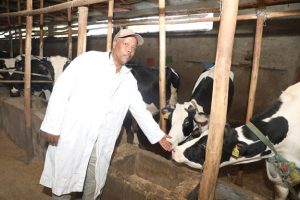
Experiencing challenging fiscal year induced from pandemic and swarm infestation that can cause critical social, economic crisis, the country is endeavoring to boost agricultural production intended to curb food insecurity.
A recent Humanitarian Impact Situation assessment jointly conducted by the Government and partners released by United Nations Office for the Coordination of Humanitarian Affairs (OCHA) indicated that at least seven million vulnerable Ethiopians to COVID 19 and nearly one million people affected by desert locust became in need of life-saving assistance including food and non-food backings.
OCHA noted that some 3.5 million quintal product was damaged by the swarm on 197,163 hectare land. However, the government in collaboration with stakeholders has made considerable effort to reduce the impact, said Agriculture Minister Umer Hussein.
Currently, six jets and one helicopter are serving to spray the insecticide in Oromia, SNNPs, and eastern parts of the country, he said, adding that the ministry has sprayed insecticide on 260,812 hectare land so far.
The Ethiopian Herald noticed that the worst affected crops by the swarm are sorghum, maize and wheat that respectively faced 113 639, 41 341 and 36 188 hectares hit.
Agriculture State Minister Sani Redi for his part said that the government is working to get 63 million USD financial assistances from World Bank so as to technologically strengthen the prevention activities of the swarm that is expected to be a threat until next October.
The government has conducted a survey on the way how to solve the impacts reached on the agriculture sector caused by swarm and pandemic. It has also revised its schedule in a bid to strengthen national capacity to resist production reduction, he noted.
The country has produced considerable amount of agricultural products in Meher season and there is better weather to Belg production, Umer said.
Consequently, ministry plans to produce 40 and 80 million additional quintals of major
crops and fruits and vegetables respectively than the annual plan in Belg season, he stated.
In this regard, the ministry is working to mitigate impacts of COVID 19 through awaking the farmer by dispersing about 70,000 extension workers. The experts are supporting farmers to produce more along with preventing the pandemic, he mentioned.
The pandemic might increase the number of people who need immediate aid in addition to the 24 million people who live under poverty line, he expressed.
Currently, the country has eight million people under the support of Safety Net program while six millions need immediate relief, it was learnt.
“We are working to produce more through strengthening farming efforts and irrigation facilities considering that ten million people are in need of food aid due to the epidemic,” as to Umer.
The ministry has provided 70 percent of imported fertilizer to meet farmer’s demand mentioning that the rest will be supplied
within two months, he said.
The government has cut customs duties on importing devices intended to mechanized farming. It is also encouraging the private sector to engage in irrigation farming injecting 20 billion birr this budget year, he noted.
It is also stimulating the exportable agricultural products including coffee, cut flower and livestock, he stated.
Ministry of Agriculture is endeavoring to substitute import by increasing productions in Belg and Meher seasons. This includes applying farming on 1.7 million hectare additional unexploited arable lands. In addition, there is also a plan shift to cover 100,000 hectare of cotton lands by crops, according to the state minister.
The occurrence of coronavirus has become additional factor to the reduction of agricultural productivity of the nation that has been affected by desert locust since the infestation began in late 2019 causing a significant threat to food security, it was learnt.
The Ethiopian Herald May 5/2020
BY YOHANES JEMANEH




